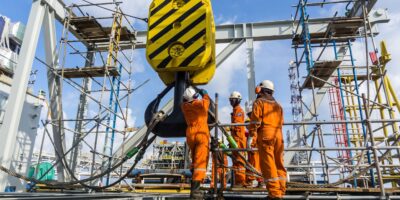Qatar’s construction industry has experienced unprecedented growth over the past decade, with ambitious infrastructure projects reshaping the nation’s landscape. From skyscrapers to stadiums, Qatar’s construction sector is fast-paced and demanding, requiring precision, efficiency, and stringent safety measures. In this context, technologies like GPS vehicle tracking and In-Vehicle Monitoring Systems (IVMS) have emerged as game changers, revolutionizing how construction companies manage their fleets and ensuring operational success.
1. Enhancing Fleet Efficiency
One of the biggest challenges construction companies face is managing large fleets of vehicles and heavy equipment spread across multiple sites. GPS tracking provides real-time visibility into the exact location of every vehicle and machine, allowing managers to monitor their assets efficiently.
- Optimized Route Planning: GPS tracking enables construction firms to plan the most efficient routes for transporting materials, reducing fuel consumption and travel time. In Qatar’s urban areas, where traffic congestion can delay deliveries, route optimization ensures that projects remain on schedule.
- Reducing Downtime: By knowing the precise location and status of vehicles, fleet managers can minimize idle time and maximize the use of each vehicle, leading to improved productivity.
2. Improving Safety Standards
Safety is paramount in the construction industry, where hazardous environments and large vehicles can lead to accidents. IVMS systems play a critical role in monitoring driver behavior and ensuring vehicles are operated safely.
- Driver Behavior Monitoring: IVMS tracks crucial data such as speed, harsh braking, rapid acceleration, and fatigue. If a driver exhibits risky behavior, the system can send instant alerts to fleet managers, allowing them to take corrective action and prevent potential accidents.
- Compliance with Safety Regulations: Qatar’s construction industry is subject to stringent safety standards. IVMS helps companies comply with these regulations by ensuring vehicles are driven responsibly and that safety protocols are followed at all times.
3. Reducing Fuel and Maintenance Costs
Fuel and maintenance are two of the largest operational expenses in the construction sector. GPS tracking and IVMS provide significant savings in these areas.
- Fuel Efficiency: By using GPS data to optimize routes and reduce unnecessary idling, companies can significantly cut down on fuel consumption. Additionally, monitoring driving behaviors such as speeding or over-revving engines ensures that vehicles are operated more efficiently, further reducing fuel costs.
- Preventive Maintenance: IVMS systems allow fleet managers to track vehicle usage and receive alerts when maintenance is due. This proactive approach reduces the likelihood of unexpected breakdowns, which can cause costly project delays. Regular maintenance based on usage data also extends the lifespan of vehicles and equipment, saving on replacement costs.
4. Asset Security and Theft Prevention
Construction equipment is often left on job sites overnight, making it vulnerable to theft. GPS tracking offers a solution by providing real-time location data, allowing companies to monitor their assets 24/7.
- Geo-Fencing: With GPS tracking, companies can set up virtual boundaries (geo-fences) around job sites. If a vehicle or piece of equipment moves outside the designated area without authorization, an alert is triggered, allowing for immediate action.
- Asset Recovery: In the event of theft, GPS tracking systems make it easier to recover stolen vehicles and equipment by providing law enforcement with accurate, real-time location data.
5. Enhanced Project Management and Reporting
GPS tracking and IVMS systems are invaluable tools for project managers, offering insights that were previously difficult to obtain.
- Real-Time Reporting: Managers can access real-time data on vehicle usage, driver behavior, and fuel consumption, enabling more informed decision-making. This data is crucial for maintaining tight project timelines and budgets, particularly in Qatar, where construction projects are often complex and time-sensitive.
- Performance Analysis: By analyzing data collected from GPS and IVMS systems, construction companies can assess the performance of their fleet and workforce. This enables continuous improvement in operations, helping companies remain competitive in a rapidly growing industry.
6. Supporting Sustainability Initiatives
As Qatar moves toward more sustainable development practices, the construction industry is under pressure to reduce its environmental footprint. GPS tracking and IVMS systems support sustainability by improving fuel efficiency, reducing emissions, and promoting responsible driving behavior.
- Lower Carbon Emissions: Optimized routes and reduced idling directly contribute to lower fuel consumption, reducing the carbon footprint of construction operations. In a country where environmental responsibility is becoming increasingly important, this can enhance a company’s reputation and contribute to sustainability goals.
- Eco-Friendly Driving: By promoting safer, more responsible driving practices, IVMS systems help reduce the environmental impact of construction fleets, contributing to Qatar’s vision of a greener future.
Conclusion
The integration of GPS vehicle tracking and IVMS systems in Qatar’s construction industry is transforming how companies manage their fleets, ensuring greater efficiency, safety, and sustainability. By providing real-time insights, enhancing security, and reducing operational costs, these technologies are empowering construction firms to stay competitive in an industry where precision and accountability are crucial.
As Qatar continues to invest in massive infrastructure projects, the adoption of GPS and IVMS technology is not just an option—it’s a necessity for success in the modern construction landscape.










